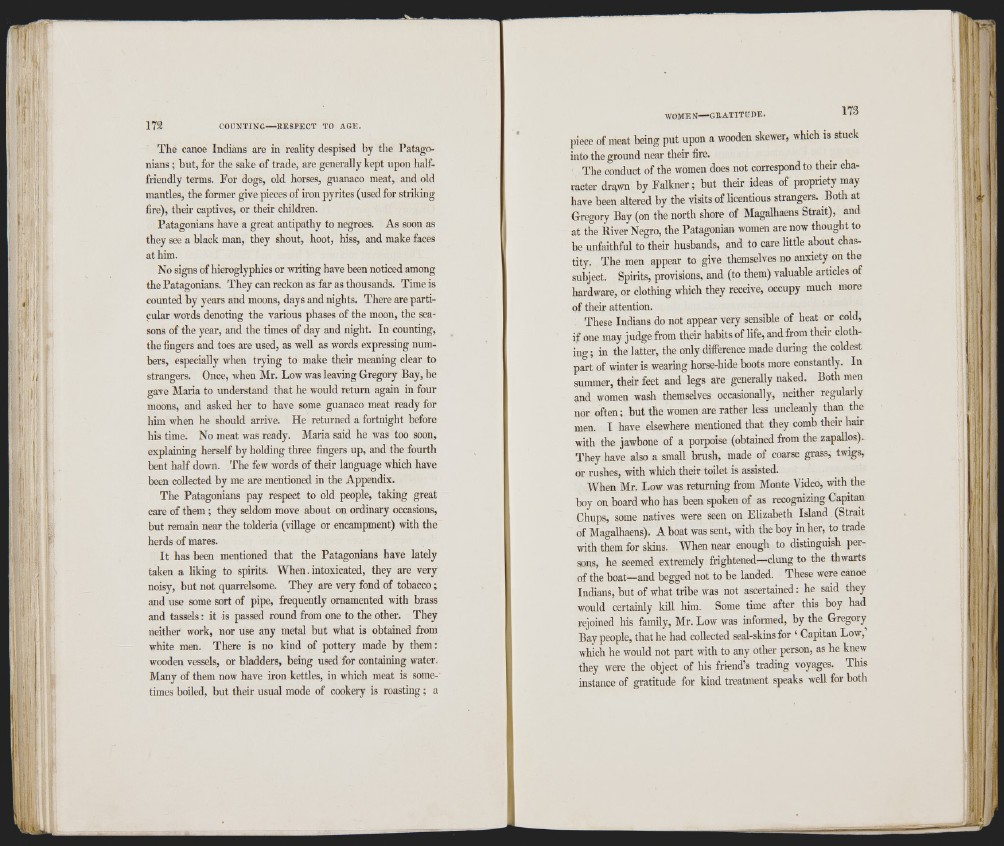
j» l.
4 ,r -í
[li- (i
,i l-
The canoe Indians ai-e in reality despised by the Patagonians
; hut, for the sake of trade, are generally kept upon half-
friendly terms. For dogs, old horses, guanaco meat, and old
mantles, the former give pieces of iron pyrites (used for striking
fire), their captives, or their cliildren.
Patagonians have a great antipathy to negroes. As soon as
they see a black man, they shout, hoot, hiss, and make faces
at him.
No signs of hieroglyphics or writing have been noticed among
the Patagonians. They can reckon as far as thousands. Time is
counted by years and moons, days and nights. There are particular
words denoting the various phases of the moon, the seasons
of the year, and the times of day and night. In counting,
the fingers and toes are used, as well as words expressing numbers,
especially when trying to make their meaning clear to
strangers. Once, when Mr. Low was leaving Gregory Bay, he
gave Maria to understand that he would return again in four
moons, and asked her to have some guanaco meat ready for
him when he should arrive. He returned a fortnight before
his time. No meat was ready. Maria said he was too soon,
explaining herself by holding three fingers up, and the fourth
bent half down. The few words of their language which have
been collected by me are mentioned in the Appendix.
The Patagonians pay respect to old people, taking great
care of them ; they seldom move about on ordinary occasions,
but remain near the tolderia (village or encampment) with the
herds of mares.
I t has been mentioned that the Patagonians have lately
taken a liking to spirits. When. intoxicated, they are very
noisy, but not quarrelsome. They are very fond of tobacco;
and use some sort of pipe, frequently ornamented with brass
and tassels: it is passed round from one to the other. They
neither work, nor use any metal but what is obtained from
white men. There is no kind of pottery made by them:
wooden vessels, or bladders, being used for containing water.
Many of them now have iron kettles, in which meat is sometimes
boiled, but their usual mode of cookery is roasting; a
1':
" r :
I .
piece of meat being put upon a wooden skewer, which is stuck
into the ground near their fire.
The conduct of the women does not correspond to their character
dra,wn by Falkner; but their ideas of propriety may
have been altered hy the visits of licentious strangers. Both at
Gregory Bay (on the north shore of Magalhaens Strait), and
at the iliver Negro, the Patagonian women are now thought to
be unfaithful to their husbands, and to care httle about chastity.
The men appear to give themselves no anxiety on the
subject. Spirits, provisions, and (to them) valuable articles of
hardware, or clothing which they receive, occupy much more
of their attention.
These Indians do not appear very sensible of heat or cold,
if one may judge from their habits of life, and from their clothing
; in the latter, the only difference made during the coldest
part of ivinter is wearmg horse-hide boots more constantly. In
summer, their feet and legs are generally naked. Both men
and women wash themselves occasionally, neither regularly
nor often; but the women are rather less uncleanly t h ^ the
men. I have elsewhere mentioned that they comb their hair
with the jawbone of a porpoise (obtained from the zapallos).
They have also a small brush, made of coai-se grass, twigs,
or rushes, with wluch their toilet is assisted.
When Mr. Low was returning from Monte Video, with the
boy on board who has been spoken of as recognizing Capitan
Chups, some natives were seen on Llizabeth Island (Strait
of Magalhaens). A boat was sent, with the boy in her, to trade
with them for skins. When near enough to distinguish persons,
he seemed extremely frightened—clung to the thwarts
of the boat—and begged not to he landed. These were canoe
Indians, but of what tribe was not ascertained : he said they
would certainly kill him. Some time after this boy had
rejoined his family, Mr. Low was informed, by the Gregory
Bay people, that he had collected seal-skins for ‘ Capitan Low,
which he would not part with to any other person, as he knew
they were the object of his friend’s trading voyages. This
instance of gratitude for kind treatment speaks well for both
’ti.i